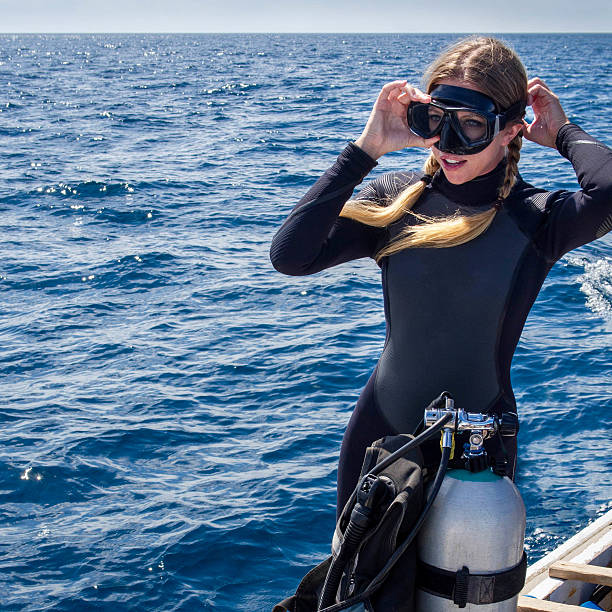MENSTRUATION DURING DIVING ACTIVITIES

Menstruation is a natural process that affects all women of reproductive age. However, when it comes to engaging in activities such as diving, questions and concerns may arise about how to manage menstruation during these activities. In this article, we will explore in detail how menstruation can affect diving, how to prepare, and what precautions to take to ensure safe and comfortable dives.
Effects of Menstruation on Diving
Physiological and Energy Changes
Fatigue: During menstruation, some women experience fatigue due to blood loss and hormonal fluctuations. This can affect energy levels during diving, especially during long or strenuous dives.
Pain and Cramps: Menstrual cramps can be a significant inconvenience. Although water can help relieve pain, it is important to note that intense physical activity can exacerbate these symptoms in some people.
Dehydration Risk
Hydration Fluctuations: Menstruation can affect fluid retention in the body, increasing the risk of dehydration. Dehydration can increase the risk of decompression sickness, so it is essential to maintain adequate hydration before, during, and after dives.
Infection Risk
Vaginal Infections: Using tampons in a moist environment like water can increase the risk of vaginal infections. Bacteria can proliferate more easily in moist conditions, so it is crucial to maintain proper hygiene and change tampons regularly.
Preparing to Dive During Menstruation
Choice of Menstrual Products
Tampons: Tampons are a popular choice but should be changed regularly to prevent infections. It is advisable to carry extra tampons in case a change is needed during the activity.
Menstrual Cups: Menstrual cups are a reusable alternative and can be more comfortable for some women. They can be worn longer than tampons and may be safer in terms of preventing infections.
Pain Management
Pain Relief Medications: Over-the-counter pain relievers, such as ibuprofen, can help manage menstrual pain. It is important to take them as directed and preferably after consulting a doctor.
Stretching Exercises: Performing stretching exercises before diving can help reduce cramps and improve flexibility, which can be beneficial for diving.
Hydration
Drinking Enough Water: Staying well-hydrated is crucial. It is recommended to drink water before and after the dive and to bring a water bottle on the dive boat.
Personal Hygiene
Regular Bathroom Breaks and Changes: It is important to ensure there are adequate facilities to change menstrual products before and after dives. Carrying wet wipes can be useful for maintaining hygiene in situations where access to water and soap is limited.
Additional Precautions and Tips
Communication with the Dive Instructor
Informing the dive instructor about menstruation can be helpful, especially if severe symptoms are experienced. Dive instructors are trained to handle various situations and can offer support and understanding.
Health Monitoring
Paying attention to signs of dehydration or discomfort during the dive. If dizziness, extreme fatigue, or any other unusual symptoms are felt, it is important to inform the dive buddy and the instructor.
Dive Planning
Planning less physically demanding dives during days of heavier menstrual flow can make the experience more comfortable. Additionally, considering the possibility of diving in warmer and calmer waters can help reduce physical stress.
Myths and Realities
Attraction of Sharks
A common myth is that menstruation can attract sharks. However, there is no scientific evidence to support this claim. Sharks are primarily attracted by fish blood and other stimuli, and the small amount of menstrual blood does not pose a significant risk.
Impact on Performance
Menstruation should not prevent women from engaging in diving activities if proper precautions are taken. Each woman is different, and it is important to listen to one's body and adjust the activity as necessary.
Conclusion
Diving during menstruation is completely possible and safe with the right preparation and precautions. Understanding how to manage symptoms, choosing the correct menstrual products, and maintaining good hydration and hygiene can make the diving experience as enjoyable and safe as at any other time of the month. Listening to your body and communicating with your dive buddies and instructors are key to enjoying the wonders of the underwater world without worries.
Effects of Menstruation on Diving
Physiological and Energy Changes
Fatigue: During menstruation, some women experience fatigue due to blood loss and hormonal fluctuations. This can affect energy levels during diving, especially during long or strenuous dives.
Pain and Cramps: Menstrual cramps can be a significant inconvenience. Although water can help relieve pain, it is important to note that intense physical activity can exacerbate these symptoms in some people.
Dehydration Risk
Hydration Fluctuations: Menstruation can affect fluid retention in the body, increasing the risk of dehydration. Dehydration can increase the risk of decompression sickness, so it is essential to maintain adequate hydration before, during, and after dives.
Infection Risk
Vaginal Infections: Using tampons in a moist environment like water can increase the risk of vaginal infections. Bacteria can proliferate more easily in moist conditions, so it is crucial to maintain proper hygiene and change tampons regularly.
Preparing to Dive During Menstruation
Choice of Menstrual Products
Tampons: Tampons are a popular choice but should be changed regularly to prevent infections. It is advisable to carry extra tampons in case a change is needed during the activity.
Menstrual Cups: Menstrual cups are a reusable alternative and can be more comfortable for some women. They can be worn longer than tampons and may be safer in terms of preventing infections.
Pain Management
Pain Relief Medications: Over-the-counter pain relievers, such as ibuprofen, can help manage menstrual pain. It is important to take them as directed and preferably after consulting a doctor.
Stretching Exercises: Performing stretching exercises before diving can help reduce cramps and improve flexibility, which can be beneficial for diving.
Hydration
Drinking Enough Water: Staying well-hydrated is crucial. It is recommended to drink water before and after the dive and to bring a water bottle on the dive boat.
Personal Hygiene
Regular Bathroom Breaks and Changes: It is important to ensure there are adequate facilities to change menstrual products before and after dives. Carrying wet wipes can be useful for maintaining hygiene in situations where access to water and soap is limited.
Additional Precautions and Tips
Communication with the Dive Instructor
Informing the dive instructor about menstruation can be helpful, especially if severe symptoms are experienced. Dive instructors are trained to handle various situations and can offer support and understanding.
Health Monitoring
Paying attention to signs of dehydration or discomfort during the dive. If dizziness, extreme fatigue, or any other unusual symptoms are felt, it is important to inform the dive buddy and the instructor.
Dive Planning
Planning less physically demanding dives during days of heavier menstrual flow can make the experience more comfortable. Additionally, considering the possibility of diving in warmer and calmer waters can help reduce physical stress.
Myths and Realities
Attraction of Sharks
A common myth is that menstruation can attract sharks. However, there is no scientific evidence to support this claim. Sharks are primarily attracted by fish blood and other stimuli, and the small amount of menstrual blood does not pose a significant risk.
Impact on Performance
Menstruation should not prevent women from engaging in diving activities if proper precautions are taken. Each woman is different, and it is important to listen to one's body and adjust the activity as necessary.
Conclusion
Diving during menstruation is completely possible and safe with the right preparation and precautions. Understanding how to manage symptoms, choosing the correct menstrual products, and maintaining good hydration and hygiene can make the diving experience as enjoyable and safe as at any other time of the month. Listening to your body and communicating with your dive buddies and instructors are key to enjoying the wonders of the underwater world without worries.
